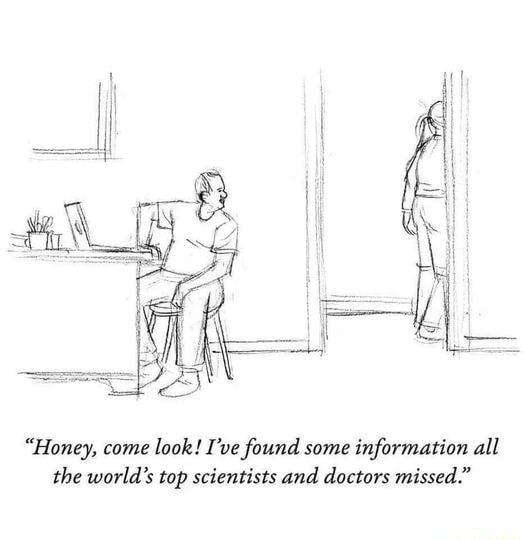Should You Do Your Own Research?

The above is a humorous look at the mantra, “do your own research,” held by many anti-vaxxers, Q-Anoners, and conspiracy theorists of various stripes. Here is a more serious look at the issue:

Now, this doesn’t mean the experts are never wrong but regarding especially the natural sciences, the experts are exponentially more likely to be right than non-experts. Simply put watching a YouTube video is no substitute for a lifetime of study. In fact, in a half-hour video you can make a case for almost any idea, no matter how absurd.
Remember too that a 5-minute clip isn’t enough to reveal say the depth of, for example, Dr. Fauci’s knowledge of epidemiology/biology/chemistry/biochemistry/molecular biology/genetics/pandemics and more vs. the complete ignorance of the subject by his detractors. (I apologize for subjecting my readers to the person questioning Dr. Fauci in the clip above. Rand Paul is a horrific human being.) The expert understands the subject a thousand levels deep whereas the talking head spouts nonsense for some personal reason.
This all reminds me of a student years ago who thought the fact that the existence today of monkeys was some kind of disproof of biological evolution. First I pointed out that he was mistaken in his belief that humans descended from monkeys (we share a common ancestor with them.) I also pointed out that evolutionary biology is understood in great detail at the molecular level. Finally, I asked him to think about the reaction to his claim that the biology department at the university. Would one say to the other “Hey Joe, did you know that monkeys exist?” And the other would respond “I forgot about that so there goes 150 of biological research. I’m surprised no one thought of this before!”
Still I tried not to make fun of the student. I told him that I had been taken in by many absurd things before I developed my critical thinking skills. For example the ridiculous ideas of Erich von Daniken’s “ancient astronaut” books back in the early 1970s.
Undoubtedly, there is a lot more to say about critical thinking and I’ve written about it many times on this blog. But if you want to learn to think well a good path would embark on a demanding curriculum in the mathematical and natural sciences along with a few classes in critical thinking and symbolic logic in the philosophy department. I’m not saying this is the only way to do this but it is a proven way. Remember too that learning how to think well, while having its own rewards, is a difficult task.
___________________________________________________________________________
The inspiration for this post came from a post on a great blog “The Weekly Sift.”
For those interested, here is a sampling of some of the things I’ve written on critical thinking.
The Basics of Critical Thinking Part 1: You Don’t Always Have A Right To Your Opinion
The Basics of Critical Thinking Part 2: Who Should I Believe?
The Basics of Critical Thinking Part 5: More Crimes Against Logic



